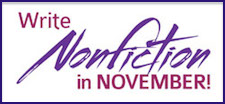By Frances Caballo (@CaballoFrances)
 In 2013, I had the best of intentions. I issued a call to my writing friends and asked them if they wanted to join me in trying to write a book in one month by participating in NaNoWriMo.
In 2013, I had the best of intentions. I issued a call to my writing friends and asked them if they wanted to join me in trying to write a book in one month by participating in NaNoWriMo.
NaNoWriMo is the acronym for National Novel Writing Month. The goal is to write a 50,000-word novel in just one month.
We met at a coffee shop on November 1 and after signing up on the NaNoWriMo website, we put our hands to our keyboards and started to type.
The problem is that I write nonfiction. I wanted to participate but the program just didn’t fit my needs. I didn’t even have an outline. All I had was a kernel of an idea.
Did I finish my book in November? No. Even worse, a year later I still hadn’t finished it.
I obviously wasn’t yet aware of the Write Nonfiction in November Challenge, aka National Nonfiction Writing Month. When I discovered this event, I decided to participate, set concrete goals and followed the SMART plan. This made a huge difference.
November SMART Formula
Here’s my SMART formula for November:
- Specific: Goals need to be specific if we want to reach them. My goal is to write every morning before I started working.
- Measurable: We need to be able to track our progress. I track my progress by writing 750 words per day.
- Attainable: Is my goal realistic or am I setting myself up for failure? I find my goal of writing 750 words per day one I could accomplish.
- Relevant: I need to ask myself whether this goal is relevant to my life right now. In this case, it is.
- Time-bound: This step simply involves setting up a time frame during which I commit to attaining my goal. My time frame is the month of November.
4 Conducive Conditions Necessary for a Month-Long Nonfiction Writing Event
We all know that we can become easily distracted from our writing. There are always emails to check, Facebook posts to write, images to pin, etc. But we also know the conditions we need to surmount these hurdles. So think about the writing conditions you need to be successful. Here are suggested conditions that might help you stick to your goal.
- Write an outline by Halloween before you start writing your next book.
- Do you write best when your home is quiet and there’s a Do Not Disturb sign on your door, or are you more productive at a reasonably noisy café? Your writing environment is important so determine which conditions you need to help you reach your goal.
- Do you get more writing done when you go to a retreat center for a few days? If so, try to get away from your home a few times a year so you can focus on editing the draft you’re creating this November. If this isn’t possible, then plan to spend a day (or more) at the library, the beach, or a café every week.
- Ask colleagues who are also nonfiction writers whether they would like to meet weekly to write so that you can keep each other accountable to your goals.

